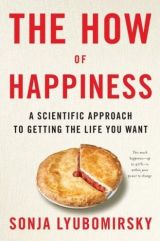


|
|
The How of Happiness: A Scientific Approach to Getting the Life You Want (Hardcover)
by Sonja Lyubomirsky
| Category:
Psychology & counseling, Positive psychology, Personal well-being |
| Market price: ¥ 248.00
MSL price:
¥ 270.00
[ Shop incentives ]
|
| Stock:
Pre-order item, lead time 3-7 weeks upon payment [ COD term does not apply to pre-order items ] |
MSL rating:
 Good for Gifts Good for Gifts |
| MSL Pointer Review:
An important contribution to the field of positive psychology and a highly recommended text on the science of happiness. |
| If you want us to help you with the right titles you're looking for, or to make reading recommendations based on your needs, please contact our consultants. |

Detail |

Author |

Description |

Excerpt |

Reviews |
|
|
|
Author: Sonja Lyubomirsky
Publisher: Penguin Press HC
Pub. in: December, 2007
ISBN: 159420148X
Pages: 384
Measurements: 9.2 x 6.3 x 1.5 inches
Origin of product: USA
Order code: BA11115
Other information: ISBN-13: 978-1594201486
|
|
Rate this product:
|
|
- Awards & Credential -
The #1 bestseller in applied psychology on Amazon.com as of January 24, 2008. |
|
- MSL Picks -
This book presents an intelligent and original approach to maximizing happiness that is exceedingly useful for psychologists, mental health professionals and laymen alike. The fact the Dr. Lyubomirsky is able to quantify, through her research, that 40% of our capacity for happiness is within our power to change, is illuminating and has the capacity to transform lives. As a clinical psychologist and Director of Psychology responsible for training doctoral level psychology interns, I have incorporated her research, principles and activities in my clinical practice as well as my teaching interns and staff. Dr. Lyubomirsky's secrets to abiding happiness provide important insights and her happiness activities and recommendations are both practical and highly effective.
(From quoting Gideon Pine, USA)
Target readers:
A new release for all those who are pursuing happiness as well as those who are skeptical about the "science" of happiness.
|
|
- Better with -
Better with
Come On People: On the Path from Victims to Victors
:
|
|
Sonja Lyubomirsky, P.h.D., is a professor of psychology at the University of California, Riverside. She received her B.A. from Harvard University and her Ph.D. in social psychology from Stanford University. Lyubomirsky and her research have been the recipients of many honors, including the 2002 Templeton Positive Psychology Prize and a multiyear grant from the National Institute of Mental Health. She lives in Santa Monica, California, with her family.
|
|
From Publisher
You can change your personal capacity for happiness. Research psychologist Sonja Lyubomirsky's pioneering concept of the 40% solution shows you how
Drawing on her own groundbreaking research with thousands of men and women, research psychologist and University of California professor of psychology Sonja Lyubomirsky has pioneered a detailed yet easy-to-follow plan to increase happiness in our day-to-day lives-in the short term and over the long term. The How of Happiness is a different kind of happiness book, one that offers a comprehensive guide to understanding what happiness is, and isn't, and what can be done to bring us all closer to the happy life we envision for ourselves. Using more than a dozen uniquely formulated happiness-increasing strategies, The How of Happiness offers a new and potentially life-changing way to understand our innate potential for joy and happiness as well as our ability to sustain it in our lives.
Beginning with a short diagnostic quiz that helps readers to first quantify and then to understand what she describes as their "happiness set point," Lyubomirsky reveals that this set point determines just 50 percent of happiness while a mere 10 percent can be attributed to differences in life circumstances or situations. This leaves a startling, and startlingly underdeveloped, 40 percent of our capacity for happiness within our power to change.
Lyubomirsky's "happiness strategies" introduce readers to the concept of intentional activities, mindful actions that they can use to achieve a happier life. These include exercises in practicing optimism when imagining the future, instruction in how best to savor life's pleasures in the here and now, and a thoroughgoing explanation of the importance of staying active to being happy. Helping readers find the right fit between the goals they set and the activities she suggests, Lyubomirsky also helps readers understand the many obstacles to happiness as well as how to harness individual strengths to overcome them. Always emphasizing how much of our happiness is within our control, Lyubomirsky addresses the "scientific how" of her happiness research, demystifying the many myths that unnecessarily complicate its pursuit. Unlike those of many self-help books, all her recommendations are supported by scientific research.
The How of Happiness is both a powerful contribution to the field of positive psychology and a gift to all those who have questioned their own well-being and sought to take their happiness into their own hands.
|
A reader (MSL quote), USA
<2008-01-24 00:00>
Which would you prefer: A second-hand account of happiness research written by a science popularizer or an insider's version written by one of the most original and creative scientists within the field of happiness studies itself? For me, the choice is an easy one. Sonja Lyubomirsky has earned her credentials as a leading expert on happiness-increasing strategies and she generously shares with her readers the secrets she has learned from rigorously conducted scientific studies. From expressing gratitude to taking care of one's body, she pours out the evidence for twelve happiness-enhancing strategies, offering persuasive rationales and practical suggestions for their implementation. The final chapter deals with the reality of depression, a topic often ignored in Pollyannish popular accounts of the happy life. You may want to start the activities before you finish reading the book, but do both and those all around you will be grateful that you did. |
|
|
|
|